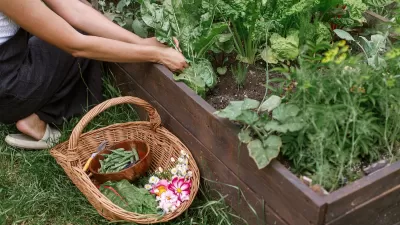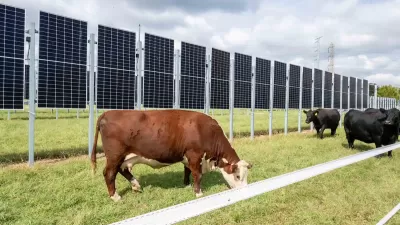Farm land ownership matters on the edges of metropolitan areas, where farmers can find lucrative markets for their products and yet, with ever escalating land prices, face daunting odds in securing land to grow on or even to get started.
By David Holtzman
I have thought a lot lately about the issue of land ownership for farmers, and the barriers they face to buying land so they can plan for growing their business and serving more food consumers.
This issue really matters on the edges of metropolitan areas, where farmers can find lucrative markets for their products and yet, with ever escalating land prices, face daunting odds in securing land to grow on or even to get started. Many farmers settle for a lease instead, which sometimes only lasts a couple years before the relationship between owner and farmer sours.
It's interesting to see that control of land for farming is an issue in urban agriculture, as well. At a recent farming conference in Richmond, Va., a board member of the Urban Agriculture Collective of Charlottesville [UACC] talked about a city-sponsored plan to redevelop her neighborhood, which would include relocating the farm she and her neighbors have worked on for seven years.
Community gardens have fallen victim to a lack of land tenure before, notably in New York City where former Mayor Rudolph Giuliani took many neighborhood gardens back for redevelopment in the late 1990s. (Successive mayors have carried on the trend he started.) Many politicians (and their developer friends) see agriculture as merely a cute placeholder until the time is ripe for construction.
In Charlottesville's case, the area proposed for redevelopment was renewed once before, in the 1960s, during the height of Urban Renewal across the country. The new plan calls for mixed-income housing rather than affordable housing, which naturally has long-time residents worried that the fabric of their community will be destroyed. Their concerns were magnified when the city made what to them was a token effort to involve them in the public process.
The interesting twist is the presence of the farm...
FULL STORY: Control of Farmland, City Style

Maui's Vacation Rental Debate Turns Ugly
Verbal attacks, misinformation campaigns and fistfights plague a high-stakes debate to convert thousands of vacation rentals into long-term housing.

Planetizen Federal Action Tracker
A weekly monitor of how Trump’s orders and actions are impacting planners and planning in America.

In Urban Planning, AI Prompting Could be the New Design Thinking
Creativity has long been key to great urban design. What if we see AI as our new creative partner?

Massachusetts Budget Helps Close MBTA Budget Gap
The budget signed by Gov. Maura Healey includes $470 million in MBTA funding for the next fiscal year.

Milwaukee Launches Vision Zero Plan
Seven years after the city signed its Complete Streets Policy, the city is doubling down on its efforts to eliminate traffic deaths.

Portland Raises Parking Fees to Pay for Street Maintenance
The city is struggling to bridge a massive budget gap at the Bureau of Transportation, which largely depleted its reserves during the Civd-19 pandemic.
Urban Design for Planners 1: Software Tools
This six-course series explores essential urban design concepts using open source software and equips planners with the tools they need to participate fully in the urban design process.
Planning for Universal Design
Learn the tools for implementing Universal Design in planning regulations.
Gallatin County Department of Planning & Community Development
Heyer Gruel & Associates PA
JM Goldson LLC
City of Camden Redevelopment Agency
City of Astoria
Transportation Research & Education Center (TREC) at Portland State University
Jefferson Parish Government
Camden Redevelopment Agency
City of Claremont




























